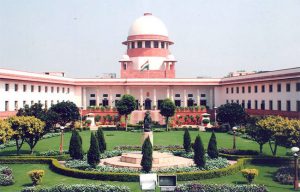 Janjivan Bureau / New Delhi : The Supreme Court on Wednesday ruled that sexual intercourse with a minor wife would amount to rape. A Bench of Justice Madan Lokur and Justice Deepak Gupta read down exception under Section 375 of the IPC that defines rape. The Bench said the age of consent (which is 18 years) can’t be lowered.
Janjivan Bureau / New Delhi : The Supreme Court on Wednesday ruled that sexual intercourse with a minor wife would amount to rape. A Bench of Justice Madan Lokur and Justice Deepak Gupta read down exception under Section 375 of the IPC that defines rape. The Bench said the age of consent (which is 18 years) can’t be lowered.
A minor wife would have to file rape complaint within a year of the alleged crime, the top court said.
The ruling harmonises the definition of rape under the IPC with POCSO which treats sex with a minor as crime irrespective of her consent. Ironically, child marriage is prohibited in India but such marriages, if solemnised, are not void. Child marriage is voidable at the instance of the minor who can exercise the option of repudiating it.
The court had already clarified that it was not dealing with marital rape in general, which women’s rights activists have been demanding to be declared a crime.
The order came on a PIL filed by Independent Thought, an NGO, in 2013, demanding to declare Exception 2 to Section 375 of the IPC unconstitutional. The NGO had contended it violated Articles 14 (right to equality), 15 (right to non-discrimination) and 21 (right to live with human dignity) of the Constitution.
The exception permitted intrusive sexual intercourse with a girl child aged between 15 and 18 only on the grounds that she has been married, the petitioner pointed out and requested the court to declare that the age of consent for sexual relationship should be treated as 18, irrespective of the marital status of the girl child.
The petitioners contended that since the legal age for giving consent for sex is 18, sex with a girl between the age of 15 and 18 in the case of child marriages even with her consent would amount to rape.
Citing the Constitution Bench verdict declaring triple talaq unconstitutional on the grounds of arbitrariness, petitioner’s counsel Gaurav Agrawal had argued that Exception 2 to Section 375 of the IPC was arbitrary and, hence should be declared unconstitutional. “It’s arbitrary because all the other laws except Section 375 treat girls below 18 as a child,” Agrawal had submitted.
Citing various reports, the petitioner had said that sexual intercourse with minor girls could lead to physical and mental health hazards.
Maintaining that the general age of consent was 18, the petitioner pointed out that the Prohibition of Child Marriage Act, 2006, made it an offence to solemnise the marriage of a girl below 18, though the marriage itself was voidable at the instance of the child and not void.
There was a disparity in the age of consent under the law, that is, the age of consent is 18 years for a girl who is not married, while the age of consent is 15 years for a girl who is married, the petitioner had pointed out.
The law should not encourage sexual relationship with a girl child less than 18 years under any circumstance and simply because the girl is married, she cannot be subjected to such a violation, the NGO had contended.
Women’s rights activists have been demanding that marital rape in general to be made a criminal offence on the grounds that it forces women to suffer the worst form of sexual violence silently within their matrimonial homes.
But in February 2015, the top court had refused to entertain an MNC executive’s plea to declare marital rape a criminal offence, saying it wasn’t possible to order a change in the law for one person. It was for the legislature to take a call on it, the top court had said.

















